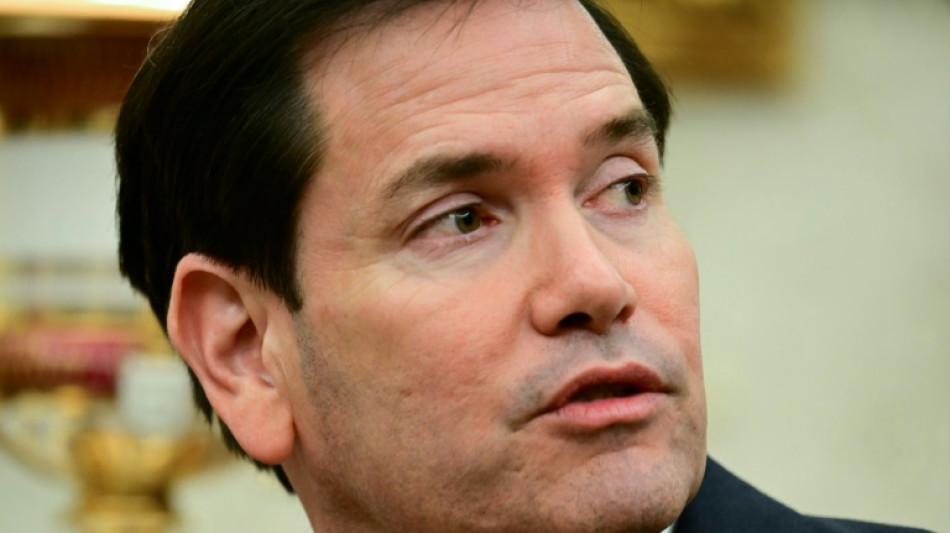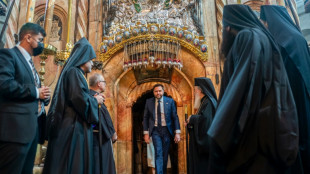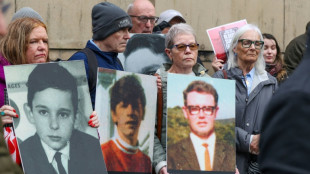

Rubio heads to Israel as US seeks to firm up Gaza truce
Top US diplomat Marco Rubio warned that Israel's moves towards annexing the occupied West Bank risked undermining a fragile US-brokered truce in Gaza, as he headed to Israel on Thursday.
Israeli lawmakers on Wednesday advanced two bills paving the way for West Bank annexation, days after President Donald Trump secured a ceasefire deal aimed at ending Israel's two-year offensive in Gaza, launched after Hamas's October 2023 attacks.
"I think the president's made clear that's not something we can be supportive of right now," Rubio said of annexation as he boarded his plane for a visit to Israel.
Annexation moves are "threatening for the peace deal," he told reporters, acknowledging the Israeli lawmakers' latest steps.
"At this time, it's something that we... think might be counterproductive," Rubio said.
Asked about increased violence by Israeli settlers against Palestinians in the West Bank, Rubio said: "We're concerned about anything that threatens to destabilise what we've worked on."
Israel has occupied the West Bank since 1967, and violence there has surged since the start of the war in Gaza.
According to the Ramallah-based Palestinian health ministry, Israeli troops and settlers have killed nearly 1,000 Palestinians, including militants and civilians, since October 2023.
Over the same period, at least 43 Israelis, including members of the security forces, have been killed in Palestinian attacks or Israeli operations, official figures show.
The United States remains the primary military and diplomatic supporter of Israel, and Rubio until recently had steered clear of criticising annexation moves championed by Prime Minister Benjamin Netanyahu's far-right allies.
But a number of Arab and Muslim countries, which Washington has been courting in a bid to provide troops and money for a stabilisation force in Gaza, have warned that annexation of the West Bank was a red line.
Hamas's moderate rivals in the Palestinian Authority exercise limited self-rule in parts of the West Bank.
- Daily threats to truce -
Rubio is the latest in a string of top US officials to visit Israel to shore up the ceasefire, following Vice President JD Vance, who was due to conclude his own trip later on Thursday.
Rubio did not rule out that the ceasefire would face threats.
"Every day there'll be threats to it, but I actually think we're ahead of schedule in terms of bringing it together, and the fact that we made it through this weekend is a good sign," Rubio said.
"This was a historic peace deal that President Trump delivered on, and now we have to make sure that it continues and that we continue to build upon it."
The truce faced its toughest test Sunday, when Israeli forces launched strikes in Gaza after two soldiers were killed. The strikes killed at least 45 Palestinians, according to the health ministry in Hamas-run Gaza.
Witnesses reported artillery fire in Khan Yunis on Thursday but no casualties.
During his visit, Vance warned that disarming Hamas while rebuilding Gaza would be a challenge.
"We have a very, very tough task ahead of us, which is to disarm Hamas but rebuild Gaza, to make life better for the people of Gaza, but also to ensure that Hamas is no longer a threat to our friends in Israel," Vance said Wednesday.
The vice president inaugurated the new Civil-Military Coordination Centre (CMCC) in southern Israel, where US and allied forces will work with Israeli counterparts to monitor the truce and coordinate aid deliveries.
Under Trump's 20-point peace plan, an international security force drawn from Arab and Muslim allies would oversee Gaza's transition as Israeli troops withdraw.
The force would not have US troops deployed inside Gaza.
Netanyahu, facing criticism from his far-right allies for accepting the ceasefire before Hamas was destroyed, defended the agreement, calling it a success that "put the knife up to Hamas's throat" while isolating the group regionally.
- 'Children's future slipping away' -
In Gaza, civilians displaced by two years of war continued to struggle.
"We were afraid of dying during the war, and now we're afraid of living after it," said Maher Abu Wafah, 42.
"Our lives and our children's future are slipping away before our eyes. We just want a stable life."
As the US diplomatic visits continued, the International Court of Justice issued an advisory opinion urging Israel to ensure Palestinians' access to essential goods and humanitarian aid.
Israel dismissed the ruling as a "political attempt" to pressure it under the guise of law.
A senior UN official warned Wednesday of "generational" impacts in Gaza from malnutrition among pregnant women and babies, urging a surge of aid to help prevent potential lifelong health issues.
Andrew Saberton, deputy executive director of the UN Population Fund, said 11,500 pregnant women face "catastrophic" conditions, with starvation posing severe risks to both mothers and newborns.
L.Rodriguez--RTC



